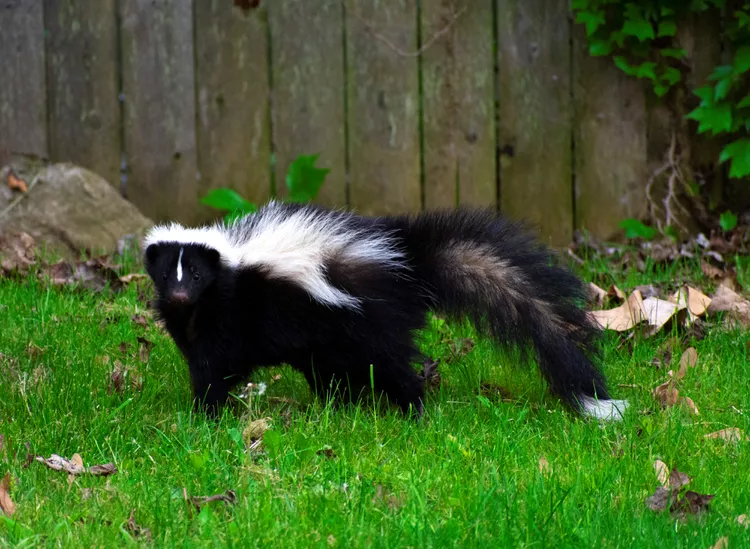How to Get Rid of Skunks in Your Yard Without Getting Sprayed

With their fluffy tails, striped bodies, and button-like noses, skunks are adorable garden visitors. Despite their charming looks, skunks can damage gardens and lawns, and they’re notorious for their stinky spray, which they release when threatened by neighborhood dogs or humans. Here are tips on how to get rid of skunks in your garden, plus a few reasons you may want them to stick around.
Garden Skunks: Friend or Foe?
Skunks can be a pet owner’s worst nightmare. During spring, skunks are particularly active, foraging for food and finding mates, and it’s all too common for hapless dogs to be sprayed during a nocturnal encounter with a neighborhood skunk.
Packed with sulfur compounds, skunk spray is famously pungent and long-lasting, and it takes a lot of effort to get the scent out of pet fur. Skunks also have the habit of digging holes in lawns while searching for grubs, and they sometimes feast on garden produce, overturn trash cans, and get into compost piles.
Skunks often signal before spraying by stomping their feet and raising their tails. If you see these signs, it’s time to put some serious distance between you and the animal. Skunks' defensive spray can reach over 15 feet, and they can spray up to six times in a row.
While skunks can cause trouble for homeowners, they also offer some benefits. Skunks are excellent hunters and foragers, and they happily gobble up lawn grubs, cutworms, hornworms, Japanese beetles, grasshoppers, mice, and voles, helping to keep gardens naturally pest-free.
Because skunks are primarily nomadic and don’t stay long in gardens unless they have a nest of baby skunks called kits, one option is to let them go about their business until they move on. However, if the creatures are causing issues you can't ignore, there are safe ways to get rid of skunks without being sprayed.
Signs of Skunk Presence
Sometimes you may see skunks prowling around your garden, or you may smell the telltale scent of their spray. But if you’re not sure you’re dealing with skunks or a different garden visitor, some key signs to look for include:
- Compost piles and trash cans that have been rummaged through.
- Missing garden produce. Skunks are particularly fond of sweet corn, but they typically target ears of corn that are low on the plant. If cornstalks are toppled over and all the cobs have been eaten, it’s more likely that raccoons or deer have been at work.
- Small, 3- to 4-inch-deep holes dug throughout garden beds and lawns. These occur when skunks are digging for insects.
How to Prevent and Get Rid of Skunks in Your Garden
Skunks are more likely to visit gardens that have a ready source of food and safe shelter. Removing these elements can encourage skunks to move on without you needing to do anything else. However, if skunks are causing a persistent problem, consult a pest control expert to arrange for their safe removal.
Remove Food Sources
Skunks go where the food is, so the first step to remove skunks is to eliminate the foods that they’re scavenging. That means securing trash cans, moving compost into sturdy compost bins, putting away bird feeders, and—if you happen to keep backyard chickens—enclosing chicken feed in pest-proof feeders. Adding a low fence around vegetable beds can keep skunks from prowling around your garden, but fences must be buried to deter digging.
If skunks have been targeting lawn grubs and other insects, avoid using pesticides, because these products can travel up the food chain and harm other animals. Instead, treat grubs with organic milky spore and use natural pest control techniques, like companion planting, to reduce insect activity in your garden.
Use Deterrent Sprays
Deterrent sprays can make gardens less attractive to skunks, but they must be reapplied often—especially after heavy rains. Humanely harvested predator urine, castor oil, and capsaicin-based sprays are particularly effective against skunks, but other strongly scented products, like fragrant bar soaps and citrus peels, may also send skunks running for the hills.
Avoid using ammonia or mothballs as skunk deterrents. These products are toxic to skunk kits and can harm outdoor pets and other wildlife.
Skunk-Proof Your Buildings
Skunks sometimes take up residence beneath sheds and porches, so block off these areas with hardware cloth. Make sure no adult skunks or kits are trapped inside before installing these barriers.
Install Motion-Activated Lights and Sprinklers
Motion-activated spotlights and garden sprinklers can also keep skunks at bay. Spotlights are particularly useful as skunks are nocturnal animals, and their eyes are sensitive to bright lights. For best results, install these deterrents near spots where skunks are most active.
Clean Up the Garden
Tall grass, rock piles, and wood piles make skunks feel safe, and they provide a spot to forage for insects and rodents. Cleaning up your garden and keeping lawns trimmed makes gardens much less appealing to skunks and other wildlife.
Trap and Relocate the Skunk
Physically removing skunks should be a last resort, as they typically will move along on their own and often don’t survive relocation. Also, relocating skunks increases the chances of being sprayed.
However, if you need to relocate a skunk, use a live trap, follow local laws when releasing skunks into the wild, and don’t trap skunks during the spring when they’re likely to have kits. If possible, work with a pest control professional who can check for skunk nests and safely remove skunks for you.